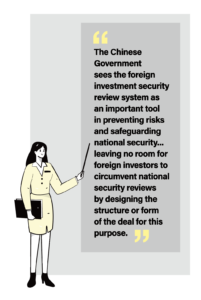
Regulatory trends impacting the sector in 2022
The last three years have seen relatively new regulatory trends hugely impact the mergers and acquisitions (M&A) market in China. Among other requirements, antitrust and national security reviews are becoming more commonplace in M&A deals. In this article, Qian Zhou of Dezan Shira summarises how these regulatory trends are affecting M&A transactions in 2022 and explores how dealmakers can prepare in advance.
Antitrust review in M&A
The completion of any M&A deal in China is subject to a series of legal and governmental regulatory conditions, the most important of which is the antitrust review.
With China stepping up its efforts to curb the disorderly expansion of capital from the end of 2020, the antitrust review has become increasingly stringent, impacting the scope of M&A transactions.
The antitrust review in M&A transactions comes under the “anti-monopoly declaration on concentration of undertakings (经营者集中反垄断申报)” as stipulated in China’s Anti-monopoly Law.
Accordingly, if an M&A deal has attained the standard for which a declaration is required, the relevant party should make a declaration to the anti-monopoly enforcement agency of the State Council in advance. The anti-monopoly enforcement agency shall examine the M&A deal and decide whether to prohibit the deal within a stipulated period. The transaction should not be made prior to the declaration or during the examination period.
M&A transactions in violation of antitrust provisions could be stopped by the anti-monopoly enforcement agency. Non-compliant deals that have been completed may be ordered to dispose of shares/assets or transfer business within a stipulated period, or adopt other necessary measures to restore ownership to the pre-deal state. Moreover, monetary penalties shall be imposed on such antitrust violations.
Even prior to the establishment of the State Anti-monopoly Bureau in November 2021, repercussions of failures to make the anti-monopoly declaration on concentration of undertakings had already intensified. In 2021 alone, the anti-monopoly enforcement agency issued 107 fines for such violations, which was eight times higher than that in 2020.
While the initial anti-monopoly crackdowns focussed on platform companies, enforcement has since expanded to other industries. It has been reported that the anti-monopoly bureau has begun sending letters of investigation to companies in traditional industries, based on tip-offs and other clues, to verify M&A transactions suspected of not being declared in accordance with the law.
In late June 2022, China passed the Amendment to the Anti-monopoly Law and released six draft antitrust regulations supporting rules that govern antitrust enforcement. This amendment significantly expands the scope of M&A transactions that are subject to antitrust reviews, and increases the penalties for not complying with the antitrust provisions.
Currently, to trigger the antitrust review, both parties in the M&A deal must have annual revenue in Mainland China of over Chinese yuan (CNY) 400 million (approximately United States dollars (USD) 60 million), among other stipulations. One of the proposed draft regulations seeks to lower this threshold to CNY 100 million (approximately USD 15 million), with antitrust reviews permissible even where just one party reaches this level. This means that more M&A deals could be subject to antitrust review, even if the target company is small. As for penalties, the revised Anti-monopoly Law has increased the maximum fines on the illegal concentration of undertakings from the previous CNY 500,000 (USD 75,000) to:
- 10 per cent of the sales amount of the preceding year against the undertaking on top of other corrective measures, where the concentration has the effect of eliminating or restricting competition; or
- CNY 5 million (USD 750,000), where the concentration has no effect of eliminating or restricting competition.
The increased damage is expected to make M&A dealmakers more conscious of the imperative of the antitrust reviews.
These amendments demonstrate China’s determination to eliminate unfair competition, with the country striving to narrow the wealth gap among various groups. Under this circumstance, the antitrust review is expected to be highly relevant to M&A transactions in China for a long time.
National security review in M&A
The national security review, or security review, is another legal procedure that impacts whether the M&A deal can be successfully completed or not. Different from the antitrust review, which affects both foreign and domestic M&A, the national security review only happens in M&A transactions involving foreign investors.
On 1st January 2020, the Foreign Investment Law came into force and established the foreign investment security review system. This applies when “a foreign investor acquires shares, equities, property shares or any other similar rights and interests of an enterprise within the territory of China”; that is, foreign M&A. Then, in December of the same year, the National Development and Reform Commission (NDRC) and the Ministry of Commerce (MOFCOM) released the Measures for Security Review of Foreign Investments (Security Review Measures), which further clarified the type of foreign investments that would be subject to security review, the institutions, the scope and procedures of security review, as well as how to deal with unlawful investment activities.
The national security review on foreign M&A transactions is, however, not recent. It has been in existence since the 2010s when the matter was subject to the following regulations:

- 2009: Provisions on Foreign-funded Mergers and Acquisitions of Domestic Enterprises;
- 2011: Provisions of the Ministry of Commerce on Implementation of Security Review System for Mergers and Acquisitions of Domestic Enterprises by Foreign Investors (MOFCOM Announcement [2011] No. 53); and
- 2015: Notice of the General Office of State Council on Promulgation of the Trial Measures on National Security Review for Foreign Investments in Pilot Free Trade Zones (Guo Ban Fa [2015] 24).
The Foreign Investment Law and the Security Review Measures have integrated and consolidated the rules previously scattered across multiple regulatory provisions.
According to the Security Review Measures, for foreign investments (including foreign M&A transactions) that affect or may affect national security, the foreign investors or the relevant parties in China should take the initiative to make the declaration to the Office of the Working Mechanism for the Security Review of Foreign Investments (Office of the Working Mechanism) under the NDRC.
Foreign investments within the following categories are subject to security reviews:
- Category I: Investments in military industry, investments in the supporting industries of the military industry and other fields relating to the security of national defence, and investments in areas surrounding military facilities and military industry; and
- Category II: Investments in other important fields relating to national security (such as important agricultural products, important energy and resources, important equipment manufacturing, important infrastructure, important transport services, important cultural products and services, important information technology and Internet products and services, important financial services, and key technologies), where the foreign investors obtain the actual controlling stake in the investee enterprise.
Regarding Category II, while the Security Review Measures enumerate multiple important fields, it provides no guidance on how to determine whether the investments are ‘important’ or not.
Meanwhile, while the Security Review Measures lists three circumstances where foreign investors are regarded as “obtaining the actual controlling stake”, it lacks specific standards on determining whether the foreign investors have a “significant impact” on the investee company. Such issues shall be subject to the discretion of the Office of the Working Mechanism before more detailed rules are released.
According to the Security Review Measures, for foreign investment falling into the scope but which failed to declare, the Office of the Working Mechanism has the right to order relevant parties to dispose of their equity or assets within a specified time and take other necessary measures to restore the original state, and this right has no time limit.
The Chinese Government sees the foreign investment security review system as an important tool in preventing risks and safeguarding national security. That’s why relevant rules on the security review of foreign investment are so stringent, leaving no room for foreign investors to circumvent national security reviews by designing the structure or form of the deal for this purpose.
Note: This is an excerpt from an article first published by China Briefing, which is produced by Dezan Shira & Associates. The original article contains further details on regulatory trends relating to digital data compliance and environmental, social, and corporate governance.
Dezan Shira & Associates is a pan-Asia, multi-disciplinary professional services firm, providing legal, tax and operational advisory to international corporate investors. Operational throughout China, ASEAN, India and the Middle East, our mission is to guide foreign companies through Asia’s complex regulatory environment and assist them with all aspects of establishing, maintaining and growing their business operations in the region. With more than 30 years of on-the-ground experience and a large team of lawyers, tax experts and auditors, in addition to researchers and business analysts, we are your partner for growth in Asia.


Recent Comments